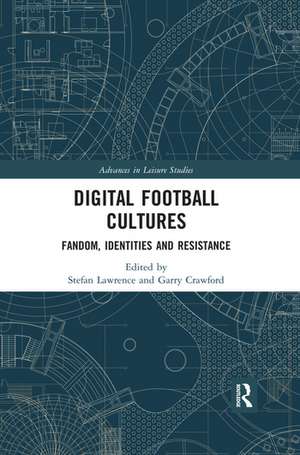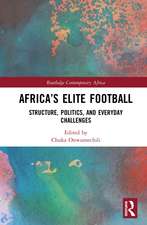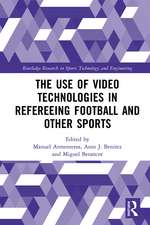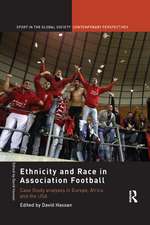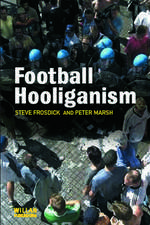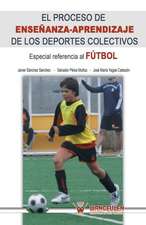Digital Football Cultures: Fandom, Identities and Resistance: Advances in Leisure Studies
Editat de Stefan Lawrence, Garry Crawforden Limba Engleză Paperback – 30 iun 2020
It presents cutting edge theoretical and empirical work based around four key themes: theorizing digital football cultures; digital football fandom; football and social media; and football (sub)cybercultures. Covering topics such as transnational digital fandom, online abuse, and gender, Digital Football Cultures argues that we are witnessing the hyperdigitalization of the world’s most popular sport.
This book is a valuable resource for students and researchers working in leisure studies, sports studies, football studies, and critical media studies, as well as geography, anthropology, criminology, and sociology. It is also fascinating reading for anybody working in sport, media, and culture.
| Toate formatele și edițiile | Preț | Express |
|---|---|---|
| Paperback (1) | 264.18 lei 6-8 săpt. | |
| Taylor & Francis – 30 iun 2020 | 264.18 lei 6-8 săpt. | |
| Hardback (1) | 1000.27 lei 6-8 săpt. | |
| Taylor & Francis – 20 aug 2018 | 1000.27 lei 6-8 săpt. |
Preț: 264.18 lei
Preț vechi: 313.60 lei
-16% Nou
Puncte Express: 396
Preț estimativ în valută:
50.55€ • 52.92$ • 41.83£
50.55€ • 52.92$ • 41.83£
Carte tipărită la comandă
Livrare economică 07-21 aprilie
Preluare comenzi: 021 569.72.76
Specificații
ISBN-13: 9780367519803
ISBN-10: 0367519801
Pagini: 224
Ilustrații: 4
Dimensiuni: 156 x 234 x 17 mm
Greutate: 0.66 kg
Ediția:1
Editura: Taylor & Francis
Colecția Routledge
Seria Advances in Leisure Studies
Locul publicării:Oxford, United Kingdom
ISBN-10: 0367519801
Pagini: 224
Ilustrații: 4
Dimensiuni: 156 x 234 x 17 mm
Greutate: 0.66 kg
Ediția:1
Editura: Taylor & Francis
Colecția Routledge
Seria Advances in Leisure Studies
Locul publicării:Oxford, United Kingdom
Public țintă
Postgraduate and UndergraduateCuprins
1. The Hyperdigitalization of Football Cultures, 2. ‘Feel It Closing In’: Digital Football Cultures in a Claustropolitan Age, 3. Transnational Digital Fandom: Club Media, Place and (Networked) Space, 4. Between Old and New Traditions: Transnational Solidarities and the Love for Liverpool FC, 5. From Backstage to Frontstage: Exploring Football and the Growing Problem of Online Abuse, 6. Gender Trouble in Digital Football Fandom: A Swedish Perspective, 7. Shifting Patterns of Football Fandom and Digital Media Cultures: YouTube, Fifa Videogames, and AFC Wimbledon, 8. Exploring the Digitalization of Football Violence: Ultras, Disembodiment and the Internet, 9. Football Videogames: Re-shaping Football and Re-defining Fandom in a Postmodern Era, 10. Restoring ‘The Football Kingdom of the Far East’: The Limited Potential of Videogames for the Development and Promotion of Hong Kong Football, 11. “Good Morning Beautiful People … I Love You but I'll Beat Your Arse in Fifa17”: The Negotiation of Social Capital and FIFA17 Match-making of Chad “Ochocinco” Johnson Twitter, 12. Football 2.0? The (Un)Changing Nature of Football and its Possible Futures
Notă biografică
Stefan Lawrence is Senior Lecturer in Socio-cultural Aspects of Sport and Leisure at Newman University, UK. His primary research interests include "race", racialization(s) and racism(s) in sport and leisure, sport for peace and social justice, and sport and digital cultures. He is especially interested in exploring football as a cultural phenomenon. Stefan is Founder of the Digital Football Network (@digiFootballnet), which was created to promote a critical approach to the study of digital football cultures. Stefan tweets from @StefanoLawrence.
Garry Crawford is Professor of Sociology at the University of Salford, UK. His research and teaching focuses primarily on audiences, media and consumer patterns, digital media and new technologies, and most specifically, sport fans and video gamers. Garry is Director of the University of Salford Digital Cluster and Reviews Editor for Cultural Sociology.
Garry Crawford is Professor of Sociology at the University of Salford, UK. His research and teaching focuses primarily on audiences, media and consumer patterns, digital media and new technologies, and most specifically, sport fans and video gamers. Garry is Director of the University of Salford Digital Cluster and Reviews Editor for Cultural Sociology.
Recenzii
"a volume that will serve as a foundational reference for future studies in digital fandom and culture for years to come … Summing Up: Highly recommended." - J. R. Mitrano, Central Connecticut State University, CHOICE May 2019
"This book provides interesting and critical insights into an immensely complex social technology which affects all cultures in our modern world, and each chapter provides a launching point for further research or discussion. It offers valuable contributions to an underrepresented area of focus within digitalisation and football studies." - Lise Joern, University of Southern Denmark
" [This book] points to an experience of supporters which today is more genuinely international, following the game online, building fan communities, expressing a cultural ownership of club, team, and players, in a manner not always welcome." -Mark Perryman, Philosophy Football
"This book provides interesting and critical insights into an immensely complex social technology which affects all cultures in our modern world, and each chapter provides a launching point for further research or discussion. It offers valuable contributions to an underrepresented area of focus within digitalisation and football studies." - Lise Joern, University of Southern Denmark
" [This book] points to an experience of supporters which today is more genuinely international, following the game online, building fan communities, expressing a cultural ownership of club, team, and players, in a manner not always welcome." -Mark Perryman, Philosophy Football
Descriere
This is the first book to bring together key contemporary debates at the intersection of football studies, leisure studies and digital cultural studies. Presenting cutting edge theoretical and empirical work, Digital Football Cultures argues that we are witnessing the hyper-digitalization of the world’s most popular sport.
